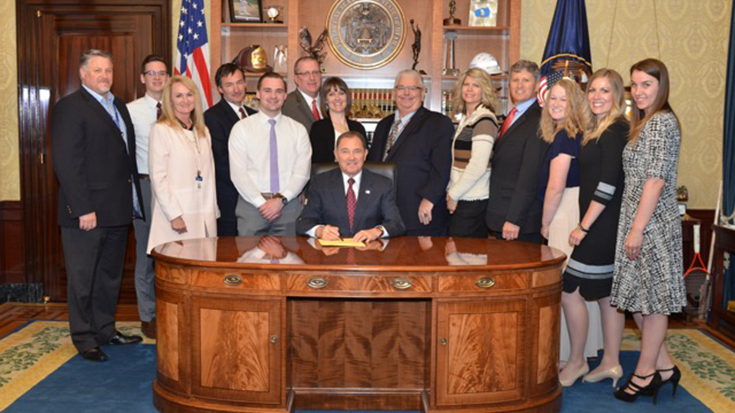
Earlier this spring, Utah’s governor signed the SCR004 resolution, helping raise awareness of postoperative opioid use and encourage in-home monitoring for patients after surgery.
“For the untold and under-reported patients who have died post-operatively at home using opioids as prescribed, we felt it our unique opportunity to raise awareness,” said Kim Bennion, MsHS, RRT, CHC.
About the bill
“Utah’s SCR004 began as a mother’s desperate attempt at raising awareness about her son’s untimely death due to taking only half his prescribed opioid dose for pain after an uncomplicated tonsil and adenoidectomy,” Bennion said.
According to Bennion, Yvonne Gardner, the mother of Parker Stewart, the son referenced above, reached out to Senator Kevin Van Tassel and House of Representative Scott Chew. Gardner worked with respiratory therapy leaders at Uintah Basin Medical Center (Shaylynn Uresk, BSRT, RRT-SDS, RRT), and Bennion, Intermountain Healthcare’s Administrative Director of Respiratory Care Services. After several meetings, they drafted the resolution.
“The key objective was to raise awareness of the risks of opioid use and to strongly recommend home monitoring to improve patient safety,” Bennion said. “The bill made it through all sub-committees, Utah’s Senate and House without a dissenting vote.”
SCR004 and RTs
“RRTs are in a unique position to improve patient safety and to provide high quality, evidence-based best practices,” Bennion said. “The passage of this bill raised this awareness, as well as highlighted the unique role RTs play as members of the healthcare team.”
Bennion referenced line #61 in the resolution where we respiratory therapists are specifically named.
“In short, this means more recognition of RRTs as healthcare professionals, experts, and consultants,” Bennion said. “More importantly it means improved awareness of the impact of opioid use on opioid-induced respiratory depression and facilitates higher quality and safer patient care.”
Beyond Utah, tips for RTs
“Never say ‘no’ to opportunities to lead projects when asked,” Bennion said.
She encourages all RTs to take the opportunity to review cases of unexpected events, both in the hospitals and in patient homes that may be opioid-related. She explains that reporting those incidents can help identify and care for higher risk patients.
“Be a champion for your patients by making every attempt to raise awareness of the risk of opioids, elevate the profession, create more jobs and improve patient safety,” Bennion said. “Your patients deserve RRTs as their advocates!”
